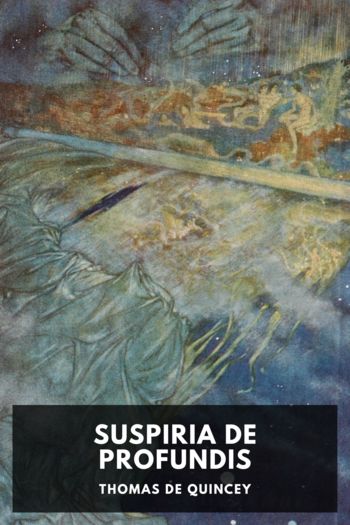Confessions of an English Opium-Eater by Thomas De Quincey (the rosie project txt) 📕

- Author: Thomas De Quincey
Book online «Confessions of an English Opium-Eater by Thomas De Quincey (the rosie project txt) 📕». Author Thomas De Quincey
Lord D⸺ placed before me a most magnificent breakfast. It was really so; but in my eyes it seemed trebly magnificent, from being the first regular meal, the first “good man’s table,” that I had sat down to for months. Strange to say, however, I could scarce eat anything. On the day when I first received my £10 banknote I had gone to a baker’s shop and bought a couple of rolls; this very shop I had two months or six weeks before surveyed with an eagerness of desire which it was almost humiliating to me to recollect. I remembered the story about Otway, and feared that there might be danger in eating too rapidly. But I had no need for alarm; my appetite was quite sunk, and I became sick before I had eaten half of what I had bought. This effect from eating what approached to a meal I continued to feel for weeks; or, when I did not experience any nausea, part of what I ate was rejected, sometimes with acidity, sometimes immediately and without any acidity. On the present occasion, at Lord D⸺’s table, I found myself not at all better than usual, and in the midst of luxuries I had no appetite. I had, however, unfortunately, at all times a craving for wine; I explained my situation, therefore, to Lord D⸺, and gave him a short account of my late sufferings, at which he expressed great compassion, and called for wine. This gave me a momentary relief and pleasure; and on all occasions when I had an opportunity I never failed to drink wine, which I worshipped then as I have since worshipped opium. I am convinced, however, that this indulgence in wine contributed to strengthen my malady, for the tone of my stomach was apparently quite sunk, and by a better regimen it might sooner, and perhaps effectually, have been revived. I hope that it was not from this love of wine that I lingered in the neighbourhood of my Eton friends; I persuaded myself then that it was from reluctance to ask of Lord D⸺, on whom I was conscious I had not sufficient claims, the particular service in quest of which I had come down to Eton. I was, however unwilling to lose my journey, and—I asked it. Lord D⸺, whose good nature was unbounded, and which, in regard to myself, had been measured rather by his compassion perhaps for my condition, and his knowledge of my intimacy with some of his relatives, than by an over-rigorous inquiry into the extent of my own direct claims, faltered, nevertheless, at this request. He acknowledged that he did not like to have any dealings with moneylenders, and feared lest such a transaction might come to the ears of his connections. Moreover, he doubted whether his signature, whose expectations were so much more bounded than those of ⸻, would avail with my unchristian friends. However, he did not wish, as it seemed, to mortify me by an absolute refusal; for after a little consideration he promised, under certain conditions which he pointed out, to give his security. Lord D⸺ was at this time not eighteen years of age; but I have often doubted, on recollecting since the good sense and prudence which on this occasion he mingled with so much urbanity of manner (an urbanity which in him wore the grace of youthful sincerity), whether any statesman—the oldest and the most accomplished in diplomacy—could have acquitted himself better under the same circumstances. Most people, indeed, cannot be addressed on such a business without surveying you with looks as austere and unpropitious as those of a Saracen’s head.
Recomforted by this promise, which was not quite equal to the best but far above the worst that I had pictured to myself as possible, I returned in a Windsor coach to London three days after I had quitted it. And now I come to the end of my story. The Jews did not approve of Lord D⸺’s terms; whether they would in the end have acceded to them, and were only seeking time for making due inquiries, I know not; but many delays were made, time passed on, the small fragment of my banknote had just melted away, and before any conclusion could have been put to the business I must have relapsed into my former state of wretchedness. Suddenly, however, at this crisis, an opening was made, almost by accident, for reconciliation with my friends; I quitted London in haste for a remote part of England; after some time I proceeded to the university, and it was not until many months had passed away that I had it in my power again to revisit the ground which had become so interesting to me, and to this day remains so, as the chief scene of my youthful sufferings.
Meantime, what had become of poor Ann? For her I have reserved my concluding words. According to our agreement, I sought her daily, and waited for her every night, so long as I stayed in London, at





Comments (0)